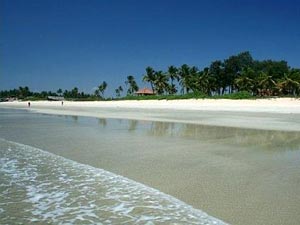
South Asian crude oil spillage spoiling Goa beaches

The study conducted by the National Institute of Oceanography has fingerprinted the crude, which repeatedly hits the Goan coastline during monsoon in form of sticky, oily tar-balls, and has traced it specifically as South East Asian Crude Oil (SEACO) and not from Bombay High, offshore oilfield located 160 km from Mumbai.
Nikhil Desai, Goa's tourism director, said on Friday that the oil spillage occurred in the jurisdiction of the Indian Coast Guard, who are tasked with apprehending ships who illegally dump their oil-lined ballast in the sea.
"It is out of our jurisdiction," he told IANS, adding that by the time the oil spill hit Goa's shores, the damage was already done.
"Compound Specific Isotope 13C analysis brought out a clear representation that all the tar balls samples are from a single source, but not from BH (Bombay High). The cross-plot of hopane biomarker diagnostic ratios also confirms that the source is SEACO," said the study released last week.
"The Middle East countries on the northwest of the Arabian Sea are rich in oil producing fields. But, there is a good demand for SEACO in these countries. The SEACO oil is transported to the Middle East countries through the Arabian Sea. It is possible that the ships that are going to the Middle East with SEACO clean the tanks in the Arabian Sea. The resulting oil undergoes weathering process, leading to tar ball formation," it said.
The tar balls, pudding-like balls of tar formed by constant exposure of crude oil to sea water, were a mystery as they lined up on Goa's beaches year after another, sometimes even threatening the state's tourism prospects.
The tourism authorities here were forced to respond to the tar ball "invasion" with an almost war-like urgency, hiring an army of sweepers and cleaners to wipe the beaches clean off the tar balls, which impart an oil-like smell to the water and deter tourists from a swim and a beach stroll.
"It is concluded that the tar balls that were deposited along the Goa coast during 2010 and 2011 are formed from the tanker-wash derived oil spills and have the characteristics of floating tar balls," said the report recently published in an international journal Marine Pollution Bulletin.
Once released into the sea, the tar balls get caught in the south west monsoon swell and move towards the western coast, specifically Goa, the study said.
"(They) eventually deposit on the nearby beaches in consistence with the circulation pattern," it said.
The institute now wants a strict vigil on the western Indian coastline to ensure that trans-oceanic ships and tankers do not dump waste oil and discharge ballast water, which pollute Goa's beaches, that attract over 2.6 million visitors annually from India and across the world.
"The International Maritime Organization (IMO) has totally prohibited de-ballasting enroute. With strict enforcement of national and international pollution laws and alert vigilance by national authority, it is possible to control the occurrence of tar balls on the Goa coast," the study said.
"The tar ball being a carcinogenic, it affects the marine life and tar ball pollution degrades health of the coastal waters off Goa," the study reported.
IANS


 Click it and Unblock the Notifications
Click it and Unblock the Notifications

































